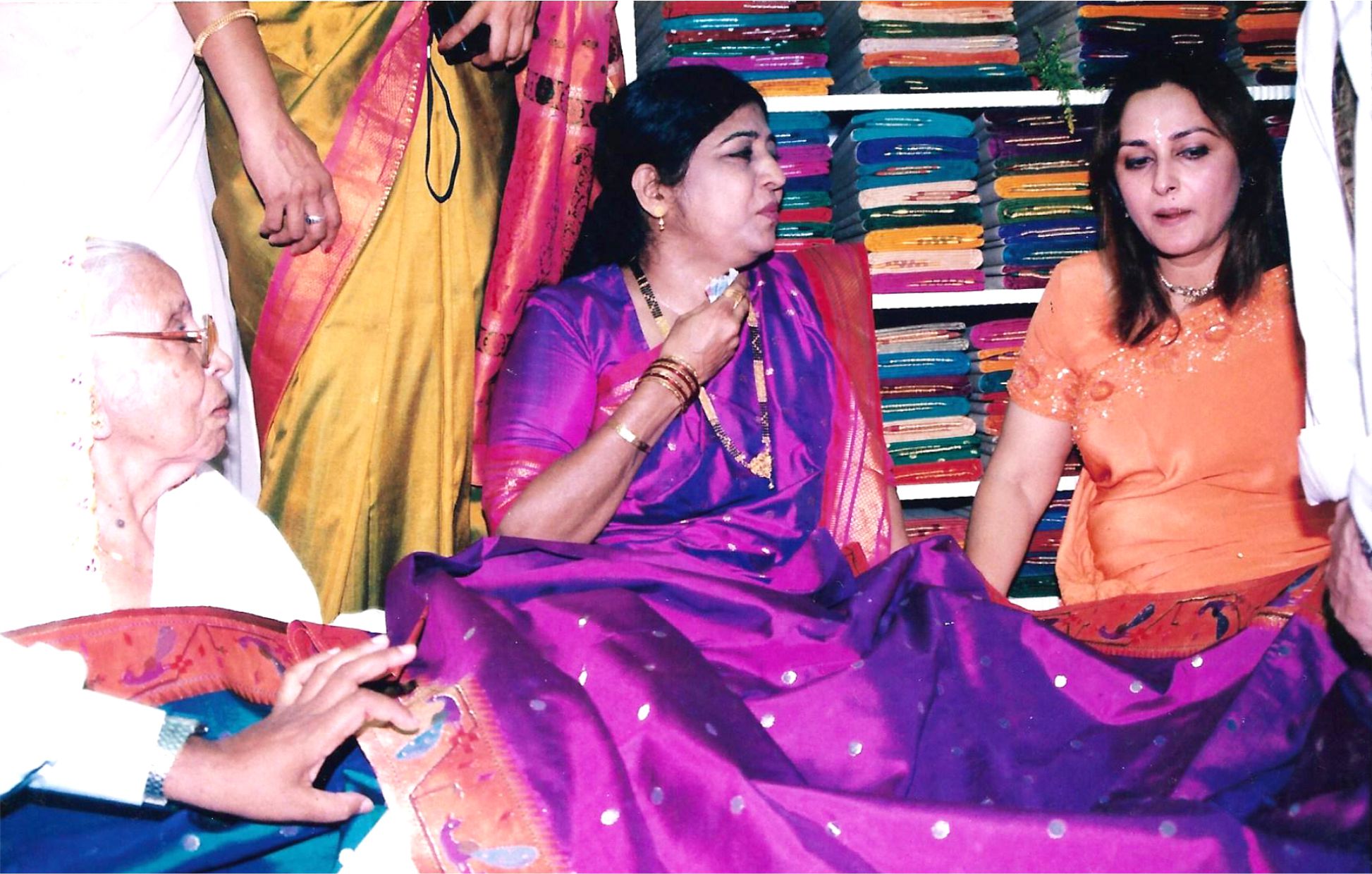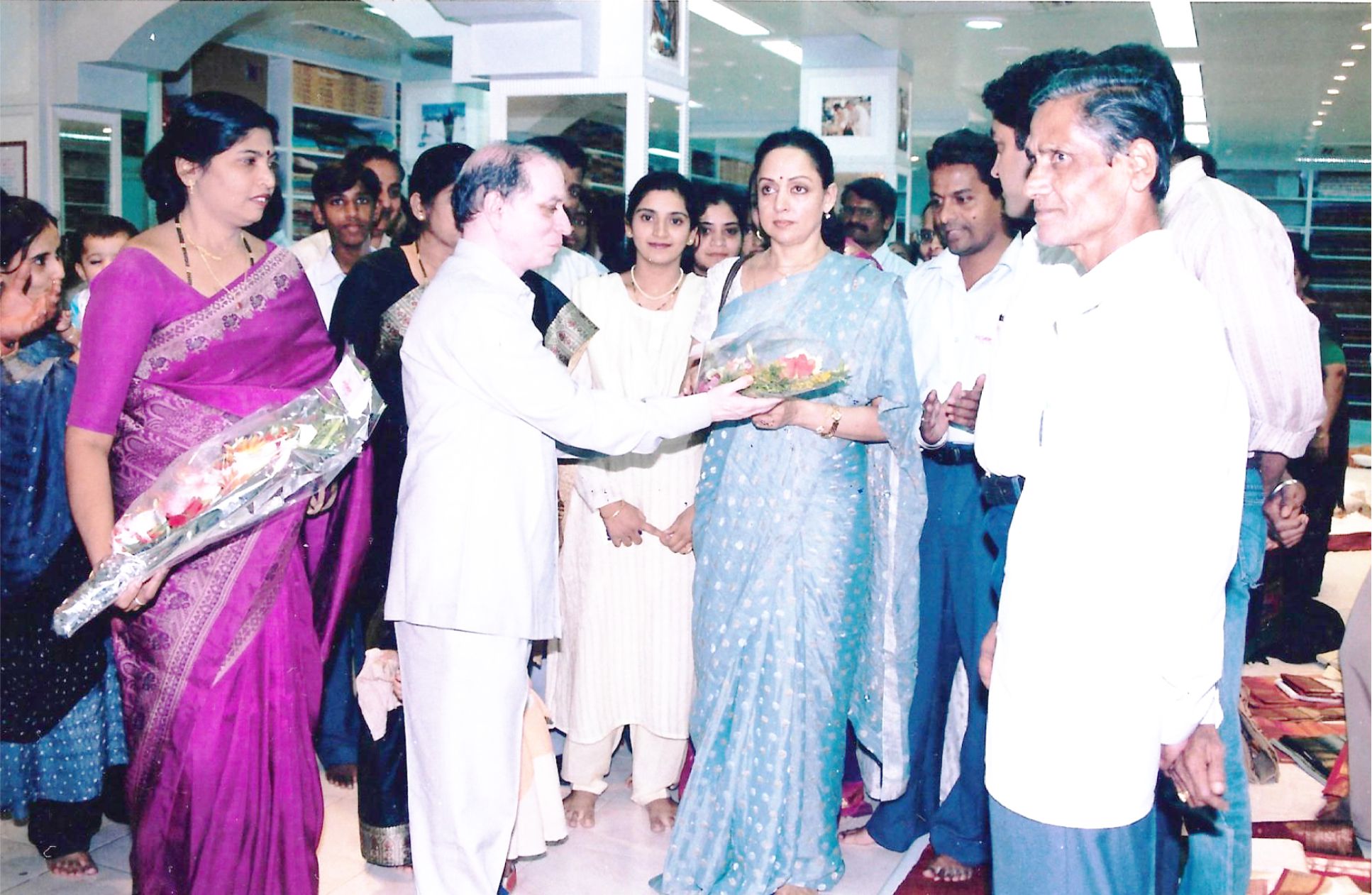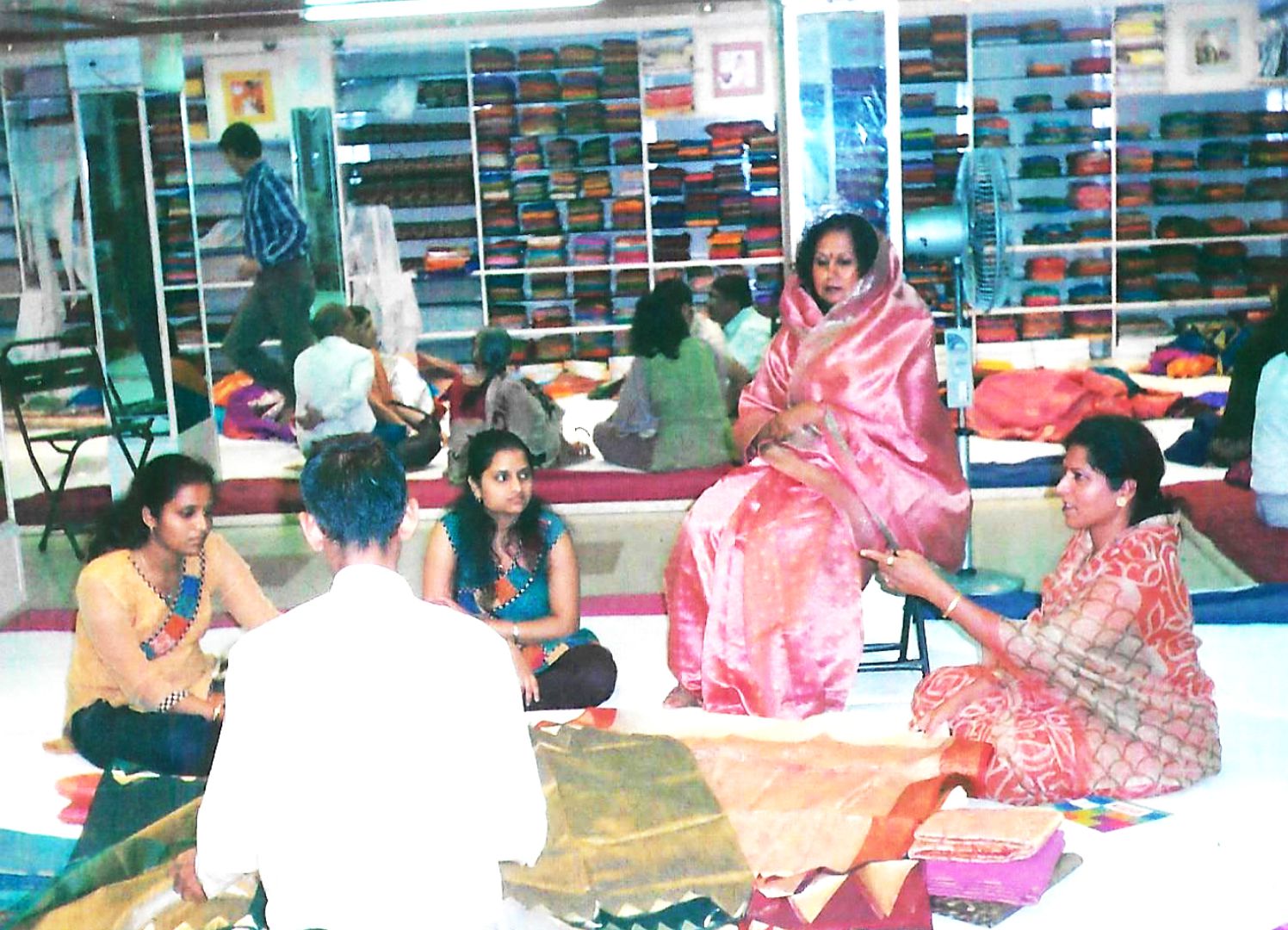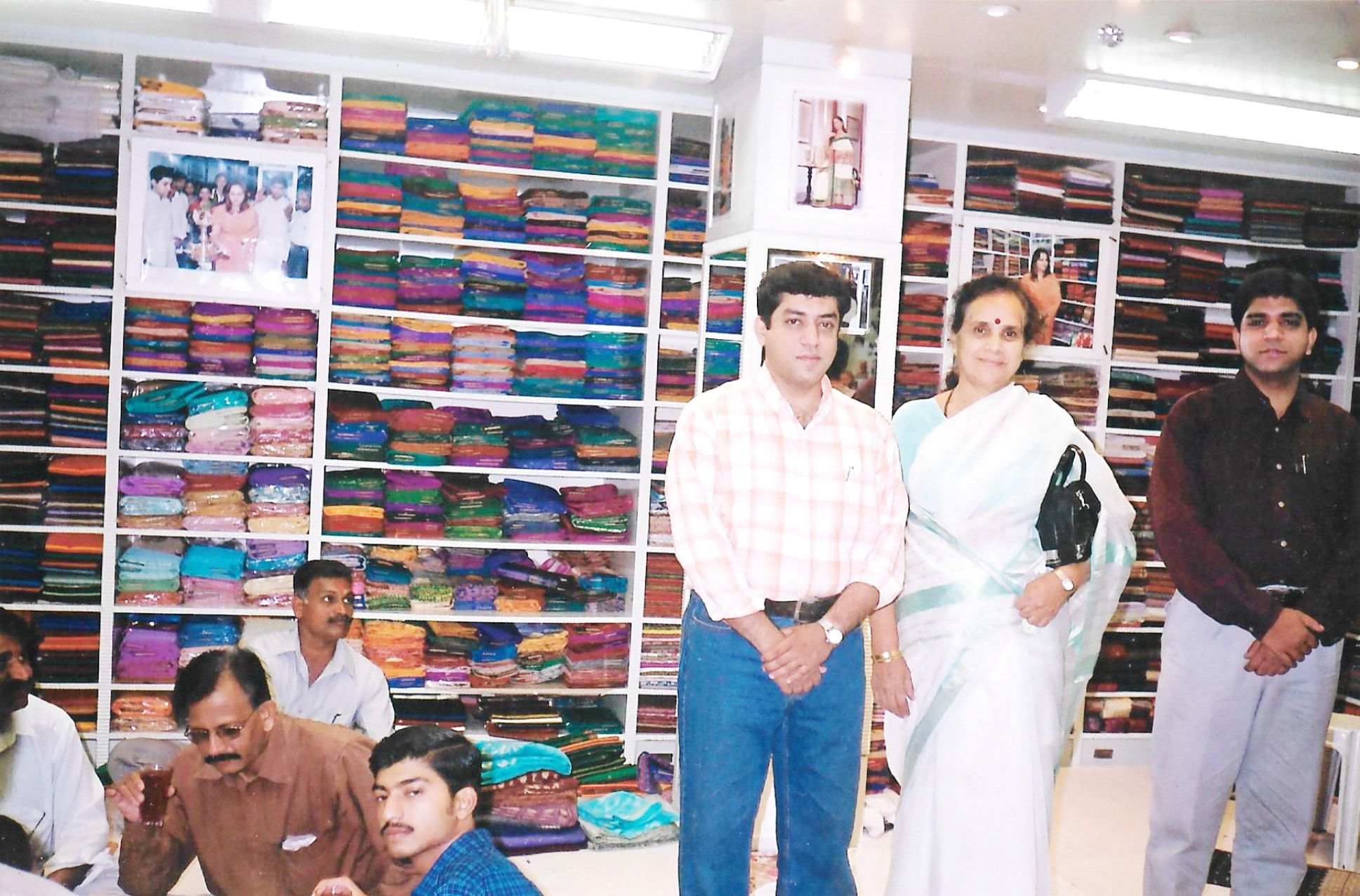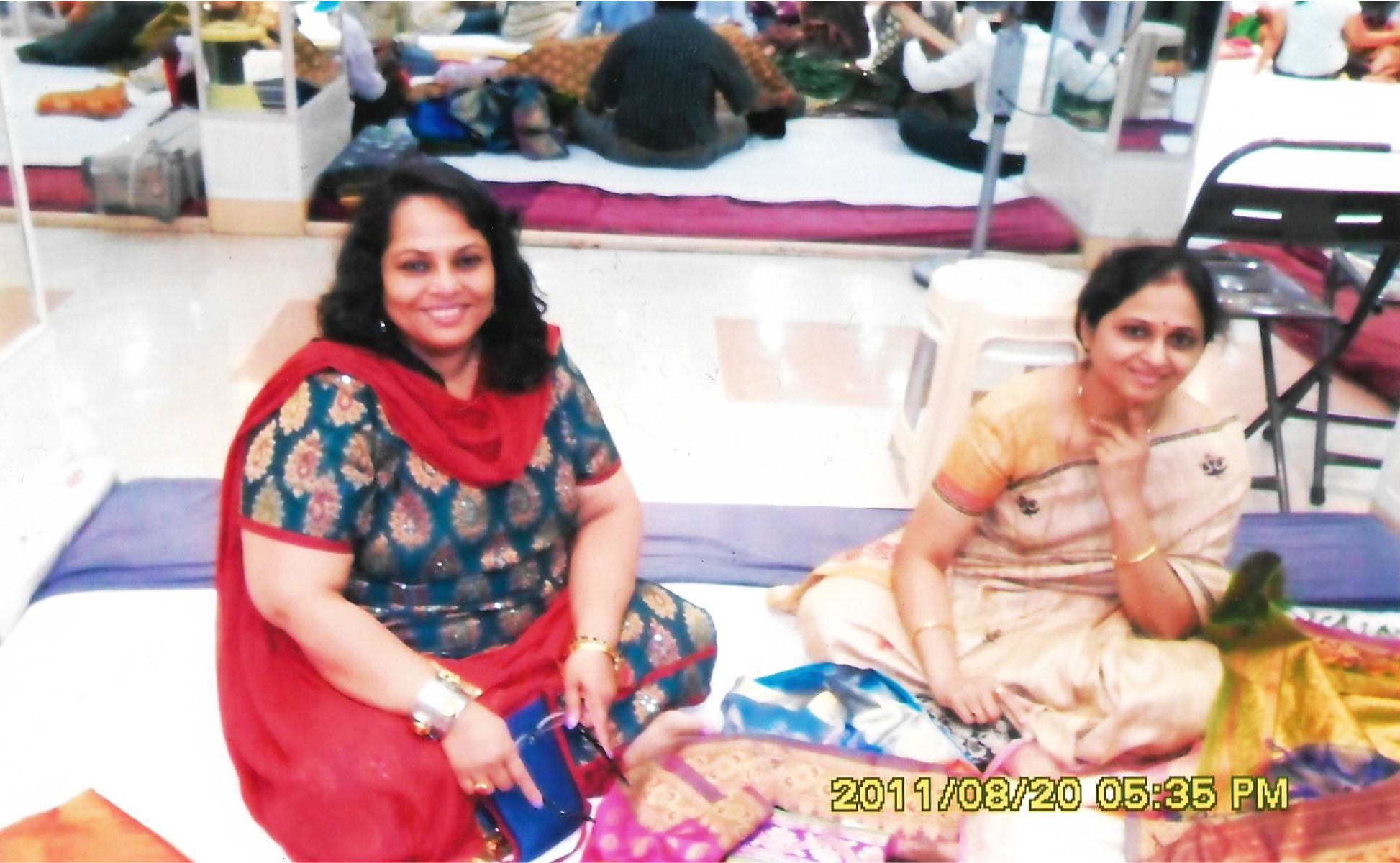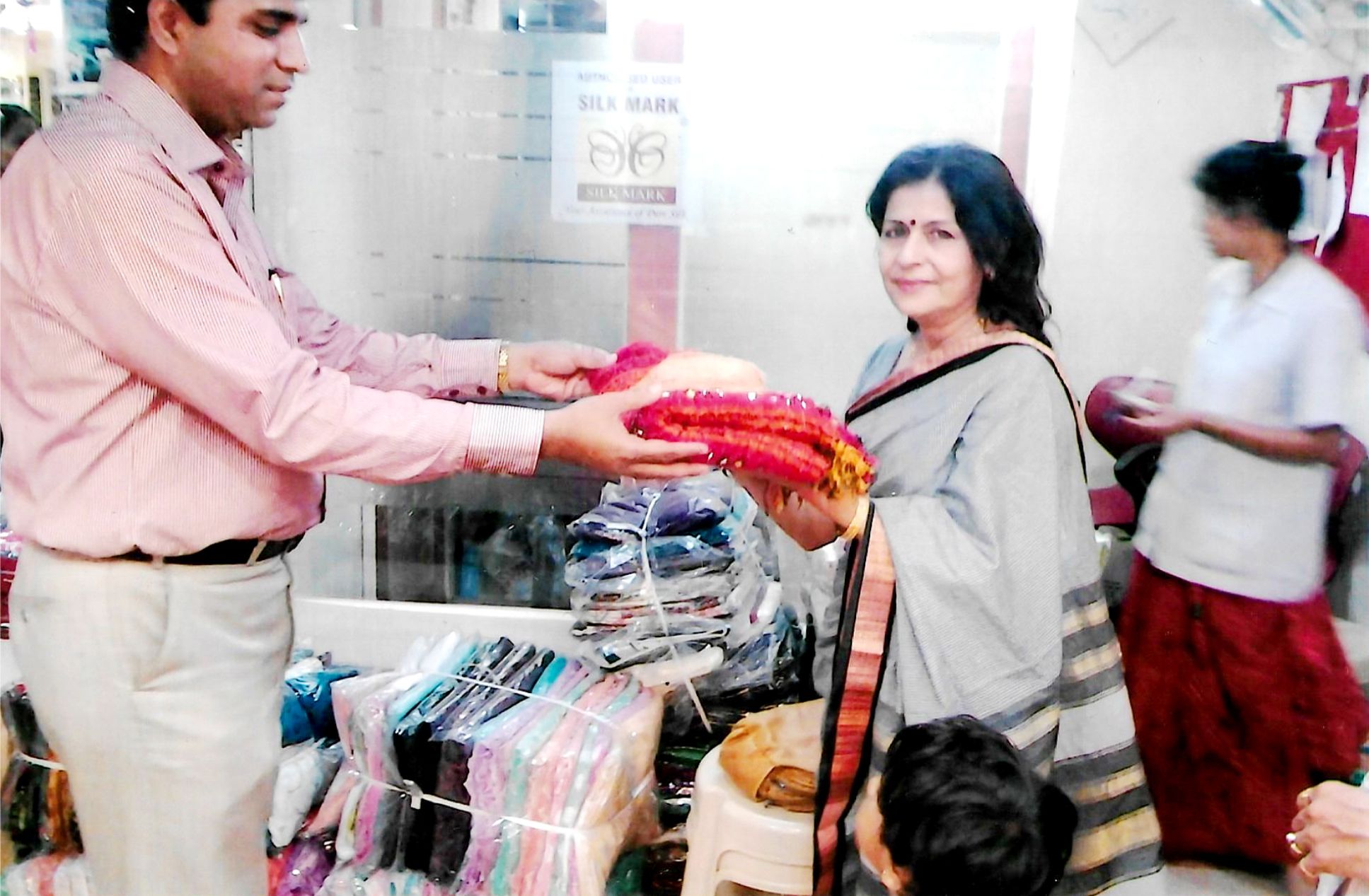Introduction
Swamini is one of the most cherished saree brands of Pune. Since its inception in 2002, it has proven time and again as the preferred choice of customers for quality fabric and fresh designs. Our spacious 3-storey showroom at Kumthekar road features the finest of Paithani, Mastani, Banarasi, Chanderi, Chiffon, Kanjivaram, Pashmina Silk, and other bespoke saree varieties. Swamini’s wedding collection and bridal sarees are loved by every generation.
We feel proud to be recognized as the iconic brand that nurtures India’s exemplary artistic culture. Our dedicated handlooms have always introduced creative trends while retaining the classic customary patterns. Whether you are from Pune or any part of the country, you will find your perfect match at our regional and traditional sarees section. From daily wear sarees, festive varieties, to special occasion masterpieces, we have a collection for everyone. Over the years, we have been a humble host to many Marathi film personalities, Bollywood celebrities, social media influencers, and prominent political figures, including former President Smt. Pratibhatai Patil. We are grateful for the trust and blessings showered upon us by our patrons not only from Maharashtra but across the world.
The Remarkable Journey of Swamini

Generational Legacy
Mr. Riyaz Bhai Shaikh, affectionately known as 'Abbu,' stands as the visionary behind Swamini Sarees. His ancestral roots trace back to Azamgarh district in Uttar Pradesh, with his great-grandfather, Mr. Gulam Mohammad, embarking on a journey to Pune in 1857, while his siblings continued managing their family's looms. With limited resources, he settled in an old mansion (wada) in Kasba Peth.
Beginning humbly, he toiled in a thread colouring shop, eventually venturing into his own handloom business, driven by his savings. In 1901, Abbu's grandfather initiated a saree store, where young Abbu spent his after-school hours both working and learning. This was the place where he nurtured his ambition to carry forward the legacy passed down by his grandfather.
At the young age of 15, Abbu made a bold move by purchasing 500 sarees from Malegaon's esteemed trader, Mr. Ramlal Kanhaiyalal. Remarkably, he managed to sell this substantial inventory in merely two months. This early success served as a catalyst for the business, prompting its expansion into various product lines, including Solapuri chadars (cotton blankets), suitings, and shirtings.
However, in a twist of fate in 1973, his grandfather had to close down the family business. While the family ventured into the hospitality industry with a hotel in Ghorpadi Peth, Abbu's passion remained firmly rooted in the saree business, leading him to pursue a career in the same field.
Early struggles and success
Abbu spent over two decades working in four distinct shops along Laxmi Road, where he served as both a salesman and purchaser. Throughout this extensive period, his dedication transcended mere monetary pursuits. His unwavering commitment to his work allowed him to gain invaluable insights into the preferences and choices of female customers concerning sarees.
Abbu's devotion to customer service knew no bounds, as he consistently went above and beyond to assist regular customers, even extending his help to those whose family members were hospitalised. These years of tireless effort and unwavering focus honed him into a consummate salesman.
Salesman to businessman
By the year 1990, Abbu had decided to leverage his sales acumen and embark on his entrepreneurial journey. Gathering a modest investment, which included his personal savings and a portion borrowed from a friend, he set his sights on procuring 11 Paithani sarees. His destination was Ahmedabad, where he intended to sell these sarees. Astonishingly, within a mere two days, he managed to sell all 11 sarees, yielding a profit of 11 thousand rupees. This successful venture marked Abbu's inaugural sale, encouraging him with a newfound sense of confidence.
At that time, Paithani sarees were fading into obscurity, but Abbu was determined to revive the Paithani and Gadwal saree market. He reached out to various women's organisations in Pune and forged sisterly bonds with its members. This sister network, comprising 52 women, would prove to be a valuable asset in his future endeavours. Abbu tirelessly traversed the length and breadth of the country to source the finest materials, gradually establishing himself as a respected wholesale saree dealer within the industry.
Venturing into retail
While thriving in the wholesale business, Abbu faced a moment of highly rude behaviour from a shop owner regarding his inventory. This incident prompted him to embark on a new journey in the world of retail. His inaugural retail establishment was initially situated in the basement of his own residence in Ganj Peth. However, he soon realised the importance of a more accessible location, particularly for female customers, and relocated the shop to the Chitrashala press building.
In his pursuit of success in retail, Abbu adopted a unique strategy. He decided to purchase sarees outright with cash from the Pune wholesale market and initially offered them to customers with no profit margins, aiming to generate widespread word-of-mouth publicity. His sister network played a pivotal role in facilitating this organic publicity.
This approach worked well as customers enthusiastically lined up outside, despite the shop's location being on the third floor, requiring a climb of 62 stairs. The shop's popularity soared to such heights that even the Chief Minister of Maharashtra visited, accompanied by his family.
Abbu introduced an innovative concept known as the "album saree," allowing customers to preview the latest saree designs before they hit the market and book them at discounted prices. As Abbu often needed to travel for business purposes and his sons were still too young to manage the shop, he sought assistance from a trusted colleague, forging a partnership agreement.
To this day, Abbu is renowned for his unwavering integrity, earning respect and admiration from a wide network of friends and fellow businessmen across all communities.
Birth of an iconic brand
The launch of Swamini has its own story. A tribute to the legendary Marathi Poet late Mrs. Shanta Shelke was organised at the Yashwantrao Chavan Natyagruha (hall). The hall was packed to capacity and eager attendees were still waiting outside the hall. The majority of these attendees had responded to Abbu's single phone call, attesting to his influential connections. It was within the grand ambiance of this event that the name 'Swamini' was unveiled in a stylish and captivating manner.
The present-day showroom on Kumthekar road was officially inaugurated on 28th Aug 2002 at the hands of renowned actress Mrs. Jaya Prada accompanied by veteran actor Mr. Tom Alter. She was also a member of parliament at the time. Although she was a south-indian actress, she still delivered a speech in Marathi language astonishing everyone at the event. One of her statements made headlines in numerous regional newspapers, where she affectionately declared, "Swamini Sarees is like my 'maaher' (mother's home), and Abbu is akin to a father figure to me."
Success never comes easy
There is a lot of hard work, courage, and sacrifice between dreams and success. For Abbu it wasn’t a different case either. While pursuing his dreams of starting his own business with a limited capital, he also had to pay for the engineering fees of both of his sons. Since he had just started out as an entrepreneur, financial challenges surfaced every now and then. He did additional jobs to support the financial needs of the family. He worked mornings working as a milkman, supported his wife in the pico fall service, and even washed cars in an elite society. Abbu largely credits his success to his wife as her role was pivotal in this journey.
The new generation
Today, Swamini stands tall with a spacious 3-storey AC showroom on Kumthekar road, one of the major shopping hubs of Pune. The reins of the business are in the hands of Abbu’s two accomplished sons Mr. Naved and Mr. Javed. The elder son Mr. Naved holds a degree in civil engineering while the younger son has a computer engineering degree. During their school vacations, when Abbu had them working in saree shops, they unfailingly lived up to their father's expectations and dutifully followed his instructions. Now, both the brothers make the best use of their engineering background to streamline the saree manufacturing process. They believe that education is the fodder for the brain and not just a means of making a living. Guided by this principle, they have spearheaded numerous innovations in the handloom and powerloom industry, enjoying the transformative journey.
Given Swamini's extensive PAN India network of vendors, artisans, dealers, and manufacturers, Abbu has wisely divided their responsibilities along regional lines, assigning the north and south zones to each of his sons.
Remarkably, the rise of online shopping has not cast a shadow over their business. The owners recognize that discerning customers, especially ladies, value the tactile experience of feeling the fabric before making a purchase. Furthermore, Swamini's showroom offers an extensive range, encompassing sarees from all online brands and fresh collections. The showroom enjoys a continuous influx of parcels from across India, arriving every 15 minutes to meet the ever-evolving demands of their discerning clientele.
Giving back to the society
Swamini Sarees celebrates its top position in the industry but remains firmly rooted in its origins. It actively engages in a variety of initiatives aimed at giving back to the society that has played a crucial role in its journey to becoming an iconic symbol of success.
- Swamini Sarees have a dedicated range named after historical women figures of India.
- The company extends its appreciation to women above the age of 80 by bestowing them with the prestigious ‘Jijau Puraskar’ Certificate when they visit the showroom.
- Teachers are also honoured through the 'Guru Devta' initiative, receiving a special saree as a token of respect.
- Additionally, lady police officers are gifted with the 'Ashtabhuja' saree during their retirement ceremony, a tradition upheld annually in the month of June.
- Swamini Sarees has extended its generosity to 80 female corporators from Pune, gifting them with the exquisite Swamini Mastani Paithani saree upon their victory.
- The company also takes a proactive approach to its staff's well-being through the Swamini Staff Welfare Fund, which covers the entire education costs of the children of its more than 80 staff members.
- Swamini has consistently advocated for crediting original artists, communities, or regions for the creation of distinguished sarees, prioritising cultural and regional authenticity over commercial trends such as those seen in serials or movies.
- In support of this commitment, Swamini Sarees purchased ten handlooms from the renowned Ahilyabai Holkar handlooms located at Fort Maheshwar. These handlooms produce 33 different types of sarees, each representing various regions of India.
- Furthermore, Swamini Sarees hosts an online podcast titled 'Yugandhar Striya' on its YouTube channel, dedicated to celebrating eminent historical women figures of India.
- While constantly evolving and introducing innovative varieties of sarees, Swamini Sarees remains steadfast in preserving and respecting the rich cultural heritage and traditions of India.
